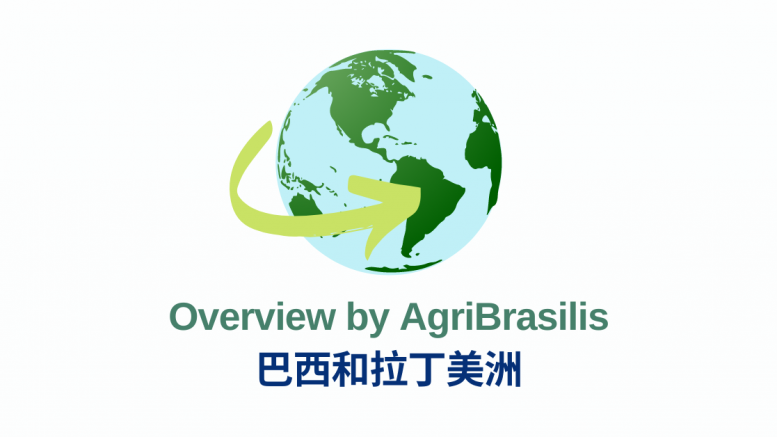Increase of Fusarium race 4 fungus in Peru
Collections of retenciones (export taxes) reached US$ 571.395 million in the 1H of 2023, a 10% drop compared to 2022 and of 50% when compared to 2021. “The lower balance of exports for the harvest caused a sharp drop in the collection of retenciones. This threatens the objective of closing the fiscal gap, one of the variables mentioned in the agreement with the International Monetary Fund”, according to a note from Rosario Stock Exchange. (BCR)
The National Institute of Agricultural Technology of Misiones, in partnership with the Japan International Research Center for Agricultural Sciences, developed a new variety of soybean resistant to Asian rust, called Doncella INTA-JIRCAS. According to the researchers, the variety has good yield potential, high protein content and high resistance to rust. Adrián De Lucia, specialist in genetic improvement at INTA, said that “the genetic material that was developed will be very useful for a stable supply of soybeans and an increase in yields in Argentina and South America, because of the reduction of losses caused by diseases”. (INTA; JIRCAS)
![]()
Sicoob estimates a 33% financing increase for the 2023/24 season, reaching US$ 10.81 billion. The institution plans to allocate US$ 7.69 billion to agricultural funding operations, US$ 1.66 billion to investment operations and US$ 1.46 billion to industrialization and commercialization. (Sicoob)
State of São Paulo reaches a record for vaccination against brucellosis. According to the Animal and Plant Defense Management System, 473,420 cows were vaccinated, or 97.99% of all animals. This is the highest percentage since 2022, when mandatory vaccination began. For ranchers who have not vaccinated their herds, a notice of infraction will be issued in the amount of 5 Fiscal Units from the State of São Paulo, that corresponds to US$ 7.13 per unvaccinated female animal. (Gedave)
Ministry of Agriculture published Ordinance No. 840 on July 11th, that established the soybean sowing calendar for the 2023/2024 season for 21 Brazilian States. The Agricultural Federation of the State of Paraná is requesting that the 140-day sowing period returns in the State, since it was reduced to 100 days. (MAPA; FAEP)
City of São Paulo, State of São Paulo, recorded the first case of avian influenza H5N1 in a wild bird. Brazil reached 61 confirmed cases in wild animals. (MAPA)
President Luiz Inácio Lula da Silva said he is in favor of cooperation with Colombia in reducing deforestation in the Amazon. “What is done on one side of South America has repercussions on another,” said Lula during the closing of the Technical-Scientific Meeting on the Amazon, organized by the Colombian government. (Government of Brazil)
Coffee exports are to decline in 2023. From January to June, total exports fell by almost 19%, to 16.2 million bags. (Cecafé)


In Ecuador, the agricultural activities most responsible for deforestation are palm, coffee, cocoa, and livestock, according to Carolina Rosero, director of the Amazon program at Conservation International. “The only ones trying to correct their past mistakes are in the palm farming business” said Rosero. (Conservation International)

Rainfall started in the corn-farming regions of the southern plateau, stimulating the planting of summer crops, that had been delayed because of the drought. Jalisco and Michoacán regions recorded their first rains this season, between 25 mm and 50 mm. Drought and excessive heat in the northern region of the country accelerated the drying process and the harvest of winter crops. (National Meteorological Service)

![]()
Rainfall increased the spread of Fusarium race 4 tropical fungus in organic banana farms. In two months, the number of cases of the disease increased from 137 to 200 in farms in the region of Piura. The disease causes wilting and death of banana trees. “Banana crop develops better under tropical conditions, but problems have appeared with the presence of fungi and pests, because of too much rain”, said Juan Carlos Rojas, researcher at INIA’s fruit program at Piura. (INIA Piura)
Hass Avocado Farmers Association of Peru reduced the fruit export estimates from 630 thousand to 598 thousand tonnes in 2023. Juan Carlos Paredes, president of ProHass, said that the fruits are 10% to 15% smaller in this season. ProHass expects a growth of 10% in exports by 2024. “Initially, the growth was 14%, but we dropped it because of the smaller size of the fruits”, said Paredes. (ProHass)
![]()
Country should start rice exports to Ecuador. Negotiations are underway to establish a zero tariff between the countries. The Minister of Agriculture, Fernando Mattos, said that Ecuador “is not a traditional market… but there are very good prospects that this year we can take advantage of this to improve our exports”. (Ministry of Agriculture)
Ministry of Agriculture and the Universidad del Trabajo del Uruguay signed an agreement to monitor and control huanglongbing, also known as greening, in regions with citrus farms. MGAP and INIA are already training students from the Agricultural Technological Education School to monitor the disease. Greening causes yield decrease, loss of fruit quality, lower longevity of orchards and cost increase. (MGAP; UTU)

READ MORE:

